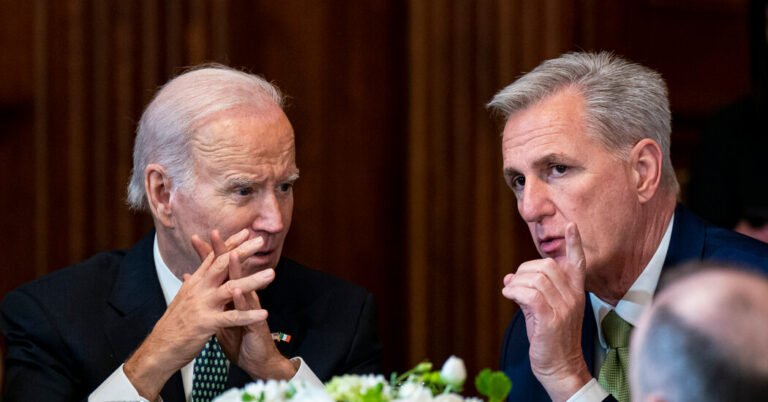
[ad_1]
President Biden and Speaker Kevin McCarthy will meet on Tuesday afternoon to discuss budget priorities and raising the debt limit at a precarious moment: The United States is quickly running out of cash to pay its bills.
Lawmakers have less than a month to pass legislation to increase or suspend the debt ceiling, which caps the amount of money the government can borrow. The United States reached its statutory $31.4 trillion debt limit on Jan. 19, and the Treasury Department estimates that the accounting maneuvers it has been employing to prop up its cash reserves could be exhausted as soon as June 1.
If the debt ceiling is not raised before the government runs out of cash — what is known as the X-date — it could be unable to pay all its bills on time, including military salaries, payments to bondholders and Social Security checks. Barring a solution, millions of Americans could stop receiving government benefits, stock markets could plunge, and a constitutional crisis could ensue.
The Bipartisan Policy Center, a think tank that tracks the nation’s cash reserves, warned on Tuesday that the X-date was likely to be between early June and early August. It said that economic risks would start to surge before the money ran out and that meeting the nation’s financial obligations would soon become increasingly difficult.
“The coming weeks are critical for assessing the strength of government cash flows,” said Shai Akabas, the director of economic policy at the Bipartisan Policy Center. “If a solution is not reached before June, policymakers may be playing daily Russian roulette with the full faith and credit of the United States, risking financial disaster for their constituents and the country.”
A default could come sooner than expected because tax revenues have been trickling into the government’s coffers this spring. The sluggish pace is due in part to a decision by the Internal Revenue Service to give taxpayers in states that were affected by severe weather more time to file their 2022 taxes.
The brinkmanship has renewed questions about how the federal government might try to prioritize certain payments if it does run out of cash, whether Mr. Biden could ignore the debt limit entirely and order the Treasury Department to continue borrowing, and if far-fetched ideas such as minting a $1 trillion coin could in fact be viable.
Treasury Secretary Janet L. Yellen said on Monday that if the debt limit was not raised, then Mr. Biden would have to decide how to proceed.
“I would say that if Congress doesn’t raise the debt ceiling, the president will have to make some decisions about what to do with the resources that we do have,” Ms. Yellen said on CNBC. “And there are a variety of different options, but there are no good options.”
She added that failing to raise or suspend the debt limit would be an “economic catastrophe” and assailed Republicans for holding the economy hostage.
“It’s a gun to the head of the American people and the American economy,” Ms. Yellen said.
Mr. Biden and Mr. McCarthy will be joined by Senator Chuck Schumer of New York, the majority leader, and Senator Mitch McConnell of Kentucky, the minority leader. Ms. Yellen is traveling to Japan on Tuesday for a gathering of finance ministers of the Group of 7 nations and will not be participating in the meeting at the White House.
The Biden administration and lawmakers are under growing pressure from business groups to find a way to avoid a default.
“A default would deliver a severe blow to the economy, leading to widespread job losses, decimated retirement savings and higher borrowing costs for families, businesses and the government,” said Joshua Bolten, the chief executive of the Business Roundtable. “Failing to raise the debt limit would also threaten the U.S. dollar’s central role in the global financial system to the benefit of China.”
He added: “Securing a bipartisan path forward to raise the debt ceiling could not be more urgent.”
[ad_2]